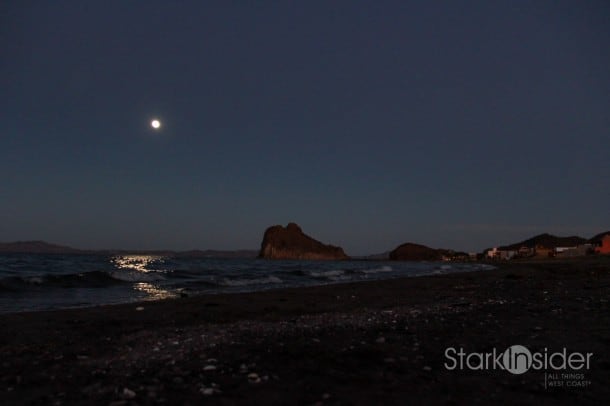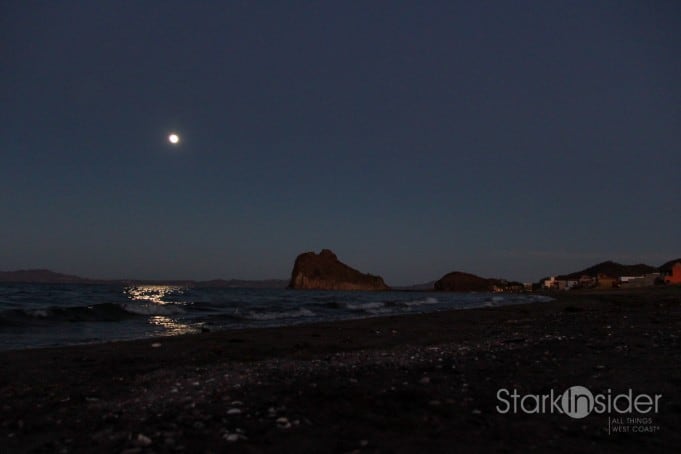
Each year we take it one kilometer at a time: Highway One, Baja California, destination Loreto. Generally a dry and dusty road through the Baja desert, this year the landscape oozes with green from recent rains. It is almost impossible not to drench myself in the expectations and dreams of a new season.
With each bit of road that passes, I imagine my morning view of the sea, my daily swim, the pleasant rhythm of my life with the velocity switch dimmed, gliding along with what comes of each day.
After hours of high desert scenery, as we catch our first glimpse of the Sea of Cortez, I feel a visceral pull.
Our annual migration has turned all of life into tumultuous transition, and my brain is learning to manage the accompanying motion sickness. In the pit of my stomach are waves of excitement stirred with apprehension.
We’re fixated on the online weather map that shows Paul as a Category I hurricane swirling directly toward Loreto.
Each year, unique with its back and forth movement, I feel somewhat more at home yet utterly homeless, settled yet unsettling. I am aware of an underlying belief that I am coming home to the place where time stands still.
My mother’s way of settling in was to cook a pot of chicken soup, and like her, I learned to create a sense of home wherever I went. Stranger in a strange land, as I soak the black beans, cook a pot of rice, make the first batch of granola, I declare dominion—and watch as the sun recedes and the skies begin to turn gray.
Before long, the winds blow and storm waters rise in our courtyard. Drenched to the core, in shorts and flip-flops we bale buckets from the garden and sweep rivers out the front door. The rain pours in as fast as we can push it out. Our actions whisper a desperate belief that we can control this.
We pause and look at one another with a brief moment of recognition that even in the midst of our current drama, we might just prefer this scenario to shoveling snow off our deck in the Sierras.
Dripping from the ceiling, leaking through the light fixture, trickling through a conduit into the breaker box, the water like a virus spreads throughout our home. Our wooden doors swell and remain as they were, open or shut.
Water intrusion feels like a betrayal of my home’s capacity to protect me. As I empty the bowls and pots scattered around the room, I feel defeated and wish I could rest my head on my mother’s breast, enveloped by her calm assurance that everything will be okay. I search for that comfort within myself. It’s coming, but I am resistant.
[House Hunters International Baja Bound Again – Filming in Loreto Bay, Mexico]
We’re fixated on the online weather map that shows Paul as a Category I hurricane swirling directly toward Loreto. We hear that the town is expecting a big ‘weather event’—what the locals call ‘chubasco’—later in the evening, and we brace ourselves, never having experienced a hurricane, unprepared for what might come. Soon after this news update, Internet and cell phones disappear, and we are unplugged, with no predictions of the future.
The afternoon skies take a deep breath and turn calm—the proverbial ‘calm before the storm’? Either the storm has diminished or we have yet to feel her whip through in pitch darkness. We extinguish our headlamps for the evening, fall into a dark quiet sleep. In the morning the ring of the cell phone awakens us, and we’re relieved that our isolation from the outside world is over for now.
Living in the Baja, we fully expect to have periods devoid of phones, Internet, or electricity. For the 3 million inhabitants spread over this skinny half-a-million-square mile peninsula, there are few modern conveniences, but we have come to rely on these lifelines to our loved ones while we live the “simple” life.
Soon after the tremendous surge of water raged from the mountains through the arroyos and canyons to the sea, Loreto calmed. Yet I still puzzle over this: in a place where time seems to move at the rate of a standing cactus, where geological evolution occurs over thousands or even millions of years, in this one event that lasted a mere 24 hours, the water slashed its way through the magnificent boulders of Tabor Canyon, uprooting trees, depositing gravel and dirt in every possible crevice, hiding boulders the size of two story houses—and changed the landscape forever. The waters spoke, the landscape responded.
The drips in our home continued on for a few days, and when I ventured into town and asked the locals how they fared, when I used the word huracán, they looked at me askance and shrugged, Oh you mean the rain? The water came into the house. No pasa nada. And it dawned on me that I could shift my perspective; perhaps minimize my sense of drama. If I were to accept that having a home in Baja means welcoming the rains in, I would understand on a deep level the truth of life here.


